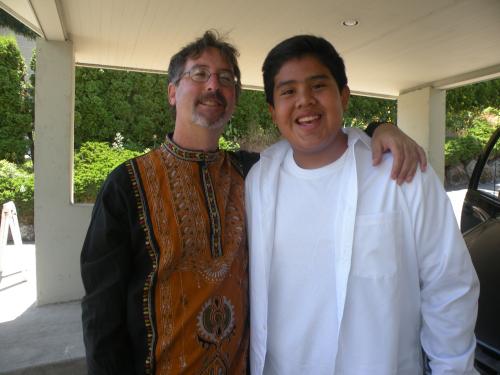
After one year of volunteering at VSO Nepal and Community Self-Reliance Centre (CSCR) I decided to visit the United States. A major part of my motivation was to attend the bar mitzvah of my cousin Isaac, who I have a connection with through basketball. I also wanted to see the members of my birth family, attending the bar mitzvah from as far away as Israel, but who primarily reside in New York, Chicago, Florida and Los Angeles.
A bar/bat mitzvah in the Jewish religion is a special time when a 13 year old boy or girl becomes a man or a woman and reads from the Torah, which consists of the foundational narrative of the Jewish people
I hadn’t seen my family members for between one to four years and of course the most obvious thing that I observed was that we are all getting older, as well as new life. I also saw more diversity. My cousins Isaac and Sophie, although very American and very Jewish, are both of Central American heritage, my son-in-law is Brazilian and a cousin’s sister married an African American man. Some of the family members are devotees of Paramahansa Yogananda, but there were also Christians and other more individual religious practices. My dad’s father who immigrated to the US from Austria in 1922 at the age of 17, and who passed away at the age of 96, would view the family in astonishment. But the reality is a multi-layered patchwork quilt which I have truly come to appreciate.
We celebrated the bar mitzvah at numerous events, with the big party held at the Burke Museum of Natural History and Culture on the campus of the University of Washington in Seattle, where one of my Nepali friends attended university. During the party one of my aunts excitedly came to me and said that there was an exhibit titled, Empowering Women: Artisan Cooperatives that Transform Communities. There were small displays from Swaziland, South Africa, Lao PDR, Peru, Bolivia, Morocco, Kenya, Rwanda, India and Nepal-Janakpur Women’s Development Center (JWDC). Besides viewing the exhibit, I also picked up a brochure from LANDESA: Center for Women’s Land Rights.
Land rights, livelihoods and gender issues are part of my work in Nepal, so that I was also excited to reconnect with my home especially when I read about Manjula Devi Thakur, an artist at JWDC. One of the quotes which I read from Manjula was, “Now I can buy milk, pens and books and pay the tuition for my children. I’m strong now I can move ahead.”
Given technology, i.e. Skype and Facebook, and my interest in worldwide connections, the reality for me is that I’m never far from my Nepali home. At the Bar Mitzvah get-togethers, both my sister and I wore clothes purchased during our various times in India. Whenever I’m on the internet I primarily am chatting with friends from India and Nepal. At the Bar Mitzvah brunch on Sunday morning a friend of my New York aunt and uncle, who was also attending the Bar Mitzvah, told me that in today’s New York Times there was an article about kayaking in Nepal. I’ve brought some books from a Nepali friend to give to her sister in Los Angeles. Another Nepali friend has asked me to call his friend in the US and the connections go on.
Nepal has become so integrated into my life that I see the country everywhere I look and I know that it continues to call me back in ways that will soon show themselves. The world is a large place, but I’m realizing, as I choose, that I’m connected no matter where I am.










Add new comment